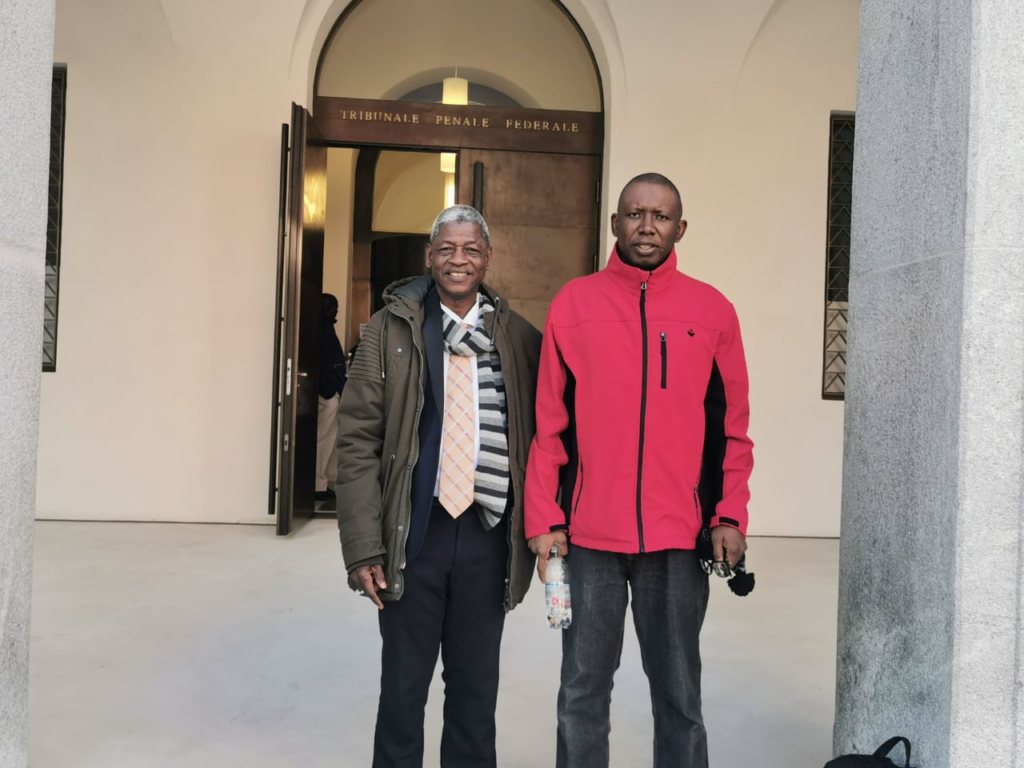Victims criticise Gambia’s absence in crimes against humanity trial against former interior minister in Switzerland

Madi Ceesay (left) and Musa Saidykhan (right) in front of the Swiss Federal Criminal Court in Bellinzona
By Mustapha K Darboe with New Narratives
Bellinzona, Switzerland–Several Gambians allegedly arrested and tortured at the National Intelligence Agency in March 2006 have criticised the government’s conspicuous absence in the crimes against humanity trial of former interior minister Ousman Sonko in Switzerland.
Arrested in January 2017, the Swiss Attorney General’s office, along with 10 plaintiffs from Gambia, is accusing Sonko of torture, murder, false imprisonment, rape, and deprivation of liberty, allegedly perpetrated against Gambians during the 22-year rule of ex-president Yahya Jammeh. Sonko, who denied wrongdoing, served under Jammeh as police chief for one year and interior minister for 10 years.
Although the Gambia government cooperated with Swiss authorities throughout the trial’s investigative procedure, the office of the country’s attorney general is not represented in the Swiss court. Nor was the office represented in the German crimes against humanity trial against Bai Lowe, a former driver of the Junglers, a paramilitary hitsquad operating on the orders of the Jammeh. (Lowe was sentenced to life in November 2023.) Musa Saidykhan— one of the 10 plaintiffs in the case against Sonko, testified on Monday. He is the former editor-in-chief of the now-banned newspaper The Independentand was allegedly arrested and severely tortured in 2006. In 2010, Saidykhan won a case against the Gambian government at the Nigeria-based Court of Justice of the Economic Community of West African States (ECOWAS) and was awarded damages of $200,000.
“I am happy that the actual trial is taking place in Switzerland. But I am not equally happy that the government is dragging its feet, especially with regards to giving justice to victims,” said Saidykhan, who was allegedly arrested and tortured with Madi Ceesay, The Independent’s then-managing director. Ceesay is due to testify against Sonko on January 23.
“I think the Gambia government should have acted before these Western countries started acting… All these trials taking place outside the Gambia are telling our government that they are either sleeping or they lack the political will,” Saidykhan said.
After Jammeh’s defeat, the new government established a Truth Commission to examine his alleged crimes. The Commission found that at least 600 people were involved in human rights violations and crimes during Jammeh’s rule. At least 71 individuals were recommended for prosecution; two individuals were prosecuted before the Commission’s recommendations but none since.
Since 2017, eight individuals have faced prosecution in the Gambia for Jammeh-era crimes. Yankuba Touray, former local government minister, and five former officials of the NIA were found guilty in trials run by the state.
“Since the change of government, seven years down the line, no concrete measures have been taken against any individual,” said Madi Ceesay. “It is a disgrace for the Gambia government to have the Swiss government try Ousman Sonko, who was part of the criminal gang of Jammeh’s regime,” he said
Torture and closure of The Independent
In the immediate aftermath of a foiled coup in March 2006, several civilians and serving military officers were arrested by the government. The Independent ran a story indicating that Samba Bah, a former deputy director of the NIA, was involved in the foiled coup. The paper had mistaken the identity of Samba with Corporal Samba Bah, a serving soldier who was implicated in the coup—according to an anonymous source.
A few days later, the paper ran a correction and an apology. Saidykhan and Ceesay were then allegedly arrested, held and tortured at the NIA for 22 days. Saidykhan told the Swiss court that their arrest was because of the government’s intolerance of critical journalism.
The Independent was considered critical of Jammeh. Before it was shut down in 2006, its printing press was burnt down by unknown arsonists believed to be working for the government. Saidykhan said that working for The Independent was “so scary,” and that the editor who preceded him at the paper “had to run for his life.”
The Swiss prosecutors are trying to prove Sonko’s responsibility for torture through his participation in various investigation panels as inspector general or for ordering or abetting abuse as interior minister.
“The whole system worked like a chain. I was arrested by the police, and [Sonko] was the head of the police. And it was the same police that handed us to the NIA,” Saidykhan said.
If Sonko “had no idea what happened to us, why was he there when we were released? Why did he make such a statement,” Saidykhan said.
This was a collaboration with New Narratives as part of the West Africa Justice Reporting Project.

